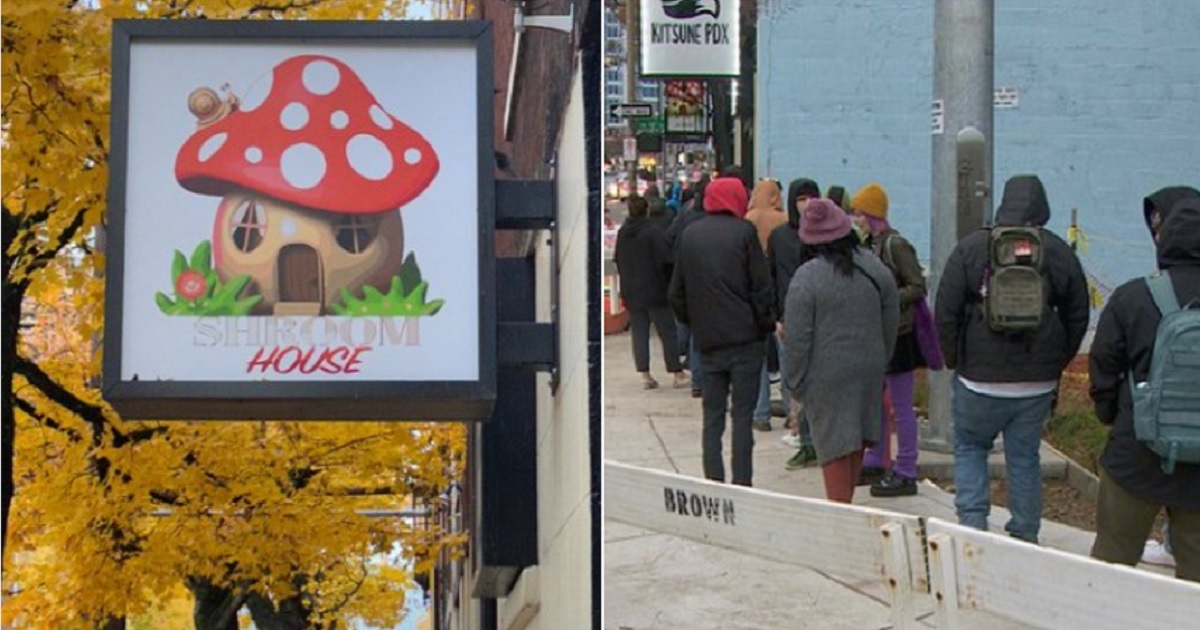If you suffer from mycophobia, you may not want to live in Oregon.
Back in 2020, Oregon became the first U.S. state to legalize psilocybin, the active ingredient in what are colloquially known as “magic mushrooms,” for personal use. As CNN reported in November, more than 1.2 million Oregonians, or 55.7 percent of voters, voted in favor of legalizing it.
While the vote happened two years ago, the application process to become a service center or facilitator isn’t slated to begin until January 2023. So, there shouldn’t be any long lines of customers waiting to ingest some psychedelic fungi in the state, at least not for another month or so.
So then why are there long lines of customers waiting to purchase said psilocybin outside of the Shroom House in Oregon?
According to KOIN-TV in Portland, there apparently shouldn’t be, as Shroom House’s entire operation is still currently illegal.
Shroom House is branding itself as a wellness shop but is very much selling psilocybin in a dispensary-like setting – a retail format that is not legal in Oregon.
Read more here: https://t.co/cR1FWqcCLp pic.twitter.com/h07AMTrPdv
— The Oregonian (@Oregonian) December 2, 2022
A former Shroom House employee identified as Kace Colwell reached out to KOIN voicing concerns about the potential illegal selling of psilocybin after he “knew something wasn’t right” about what was happening.
“I was led to believe by management at Shroom House that this was the first, medically licensed and sanctioned place to buy psychedelics in the state of Oregon,” Colwell told the station. “They’re breaking all sorts of laws over there.”
It should be noted that there are quite a few caveats about purchasing psilocybin in Oregon — even when it’s eventually legal.
As CNN reported, psilocybin must be administered at licensed “service centers” under the direction of trained “facilitators,” who need to pass testing to qualify. It’s quite different from the legalized cannabis in Oregon, which can be purchased and consumed at home without supervision.
Perhaps trying to exercise some sort of loophole, the Shroom House owner told KOIN that the store is not a “dispensary,” it’s a “health and wellness shop.”
Colwell, for his part, wasn’t buying that line of reasoning.
“They’re straight up just lying to people about the most basic facts about their store, about the shrooms being sanctioned,” Colwell told KOIN. “So I don’t know what else they’re willing to lie about.”
KOIN noted that the Portland Police Bureau’s Narcotics and Organized Crime Unit was aware of the allegations lobbed against Shroom House.
Curiously, PPB’s awareness of the situation hasn’t dampened interest in Shroom House.
In fact, as KOIN noted in a follow-up report, interest has only been booming since the station first called attention to Shroom House.
A day after Portland media reported that a business was illegally selling psychedelic mushrooms, a line has formed around the block in front of the Shroom House pic.twitter.com/YgYwlc60PU
— Ashley Koch (@AshleyKochKGW) December 2, 2022
The Shroom House on West Burnside is getting attention around the country, even The New York Times is doing a story about it. And judging by the blocks-long line of people waiting to get in and buy psilocybin, local attention is even greater.https://t.co/eV6BsfN6zb
— KATU News (@KATUNews) December 4, 2022
KOIN noted that before the initial report, the news station had only observed “a few customers coming and going.” KOIN also noted in its follow-up report that the Drug Enforcement Agency is also aware of the location.
According to KOIN, Shroom House isn’t just selling psilocybin, but “chaga, reishi and lions mane,” which are other — legal — fungi with purported medicinal qualities.
Perhaps the most damning sentiment, at least in regards to whatever it is that the DEA and PPB plan on doing about the illegal sales of all these mushrooms, came from a Shroom House customer identified as Scott Yon.
“I understand it may not be legally up yet,” he told KOIN, “but in Portland, it doesn’t seem like people get arrested for anything.”
This article appeared originally on The Western Journal.

























 Continue with Google
Continue with Google